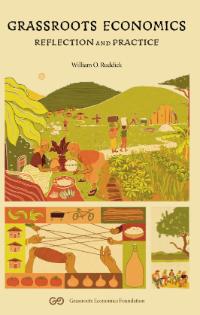Grassroots Economics
Reflections and Practice
William O. Ruddick, Grassroots economic foundation, February 2025
To download : PDF (6.2 MiB)

Imagine a community where everyone shares a role in one another’s wellbeing—a place where food, support, and resources flow as freely as nutrients in the roots and fungi beneath a forest floor. In such a community, no one is left to struggle alone, and the strength of one is the strength of all. In many communities glimpses of this spirit appear in times of crisis, when people come together to pool resources, offer help, exchange skills, and build trust. What if this wasn’t the exception but the rule—a protocol deeply embedded in our communities?
This book focuses on resource coordination protocols—the shared agreements, practices, and systems that enable fair, sustainable distribution and use of resources—inherent in living systems (both ecological and social systems) and how they can be used to support interconnected, thriving communities.
Drawing from my life among the Mijikenda people of Kenya, I share observations of practices that, while unique to specific clans and families, reflect universal protocols found across the world. These protocols resonate deeply because they connect us to the wisdom of our ancestors and the living systems we emerged from. This book is a guide to speaking about and designing resilient, self-sustaining networks of communities by drawing on natural, ancient wisdom and modern resources.
Part 1 is structured as a reflection and journey, with each reflection offering a “step” toward a system that supports every member of the planetary community. Together, we’ll query the fundamental principles of nature’s economy, the insights of ancient resource coordination practices, and the underlying protocols that can create trust, sustainability, and shared abundance. We’ll also look at where these protocols are inhibited to create centralization of power and decentralized technologies that offer a pathway to rebel.
In Part 2, you will see how these protocols have been implemented in practice by Grassroots Economics Foundation over the last decade—building on ancient tradition and supported by modern technologies. Each reflection builds on the last, providing you with core concepts and tools to bring these practices to life in your own community. You’ll also find experiential games—simple, engaging exercises that allow you to embody the principles with your community.
This guide is a call to action: The sustainable, cooperative, and resilient future we seek has already been envisioned. Instead of inventing new systems, we can rediscover the protocols that helped ancient ecosystems and communities thrive. For generations, societies all around the world operated as interwoven communities, relying on abundance created through collaboration rather than competition. These practices—constituting an economics intrinsic to all living systems—coordinated resources, shared responsibilities, and ensured that everyone’s needs were met. Today, we have the opportunity to revive and adapt these methods, integrating them with modern tools to create thriving, sustainable communities. This book is designed to support organizations and individuals in allocating resources in ways that foster long-term connections, resilience, community development, and social cohesion. Grassroots organizations, cooperatives, faith-based institutions, and activists can use it to build social belonging, trust, and economic self-sufficiency. Humanitarian and environmental organizations will find tools to align their programs with principles inspired by living ecosystems and ancient social systems. Blockchain engineers and DAO stewards can apply these protocols to manage shared resources and implement mutual credit systems effectively.
